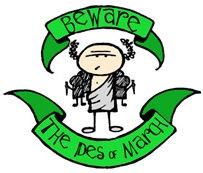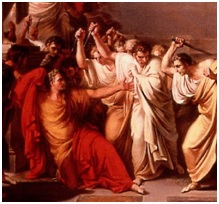|
 |
|
 |
|
|
||
Shakespeare's Julius Caesar - Leadership and Change
Julius Caesar
Key characters Julius Caesar, Roman general and leader. Calpurnia, Julius Caesar’s wife. Brutus and Cassius, leading conspirators against Julius Caesar. Portia, Brutus’s wife. Mark Antony, Octavius and Lepidus, leaders of the Roman Empire after Julius Caesar’s death. Fun facts The play has inspired many films including the 1953 Oscar winner, Julius Caesar, starring Marlon Brando as Mark Antony (pictured right).
The story Julius Caesar (or Caesar), military hero and victor over Pompey in the civil war, wants to be a dictatorial Roman king, only refusing a crown because he felt the time wasn’t right. So Cassius, a leading politician, persuades another powerful
figure, Brutus, to lead an assassination plot against Caesar. Brutus is troubled by his involvement (vetoing the murder of Mark Antony), and his wife, Portia, notices his unease. Meanwhile Caesar becomes nervous when the soothsayer tells him to “beware the Ides of March” (the middle of the month and also the next day). His anxiety increases on that fateful day when his wife, Calpurnia, begs him not to leave home after she dreams about his murder. But he is persuaded to go to the Senate (the Roman Parliament) by Decius, where he and the other conspirators (led by Cassius and Brutus) stab him to death. At his funeral, the popular Brutus speaks well in justifying the murder. But Mark Antony’s great speech convinces the people of treason by the conspirators who then flee. Mark Antony, Octavius and Lepidus take over power. Brutus and Cassius gather an army, but they quarrel, when Brutus accuses Cassius of accepting bribes. They also disagree about what they should do, just after Brutus hears that his wife, Portia, has killed herself. He is then disturbed by Caesar’s ghost who tells him they will meet at Philippi, where Brutus and Cassius are planning to fight Mark Antony and Octavius. Brutus attacks Octavius’s troops, but Cassius commits suicide, thinking his troops are surrounded. After his defeat, Brutus kills himself, too, but the victorious Mark Antony and Octavius agree to bury him with honour.
Lessons of leadership
1. Make change happen If you want something to happen, don’t passively accept your fate but positively do something about it. “The fault, dear Brutus, is not in our stars, but in ourselves, that we are underlings”, says Cassius, begging Brutus to help him end Caesar’s tyranny.
2. The power of deception Caesar fakes a collapse in front of the crowd to win their support and succeeds brilliantly. 3. Work on your weaknesses and adapt to your situation In peacetime Caesar’s biggest weaknesses are:
Brutus says about him: “The abuse of greatness is when it disjoins remorse from power”. But Caesar's ruthless decisiveness is a huge asset in battle.
4. Don’t rush into a decision Brutus would have been wiser to give further thought to the murder, carefully considering its advantages, disadvantages and likely consequences. He should have listened to his wife, Portia.
5. Morality and idealism must be practical Brutus was a man of great honour and integrity, described by Mark Antony as “the noblest Roman of them
all”. Brutus believed that the murder was a virtuous act that freed Rome of Caesar’s tyranny. But he failed to appreciate the practical results of his ideals (“peace, freedom and liberty”). When vetoing Mark Antony’s murder, he says the conspirators didn’t want to be “butchers”. But after the murder this is how Mark Antony quite rightly describes them. It is Mark Antony, practical but unprincipled, whose great speech wins over the people (see point 6), not Brutus’s misguided idealism.
6. Communication Mark Antony wins the crowd over with a great speech that famously begins: “Friends, Romans, countrymen, lend me your ears”. He dooms the conspirators by:
He speaks effectively with
7. Beware of self-delusion Cassius (like Brutus) kids himself that:
Brutus's constant self-examination of his ideals and morals (particularly honour and freedom) mistakenly leads him to murder instead of helping others. “Poor Brutus with himself at war, forgets the show of love to other men”, he says about himself.
8. Seize your opportunities Brutus tells Cassius that they must seize their opportunity to attack Antony and Octavius at Philippi, because their army is increasing daily. “There is a tide in the affairs of men which, taken at the flood, leads on to fortune”, Brutus says.
9. Watch your back Caesar is right to fear the instigator of his murder, Cassius. He thinks Cassius is dangerous (despite Antony disagreeing), because he:
But Caesar couldn’t foresee the treachery of his dear friend, Brutus, prompting his dying words: “Et tu, Brute? [And you, Brutus?]” Pictured right above is Camuccini's 1798 painting of Caesar's death. 10. The importance of courage Caesar defiantly tells Calpurnia (who is begging him not to leave the house on the day of the murder): “Cowards die many times before their deaths; the valiant never taste of death but once”. He doesn’t fear death which “will come when it will come”.
Key quotes on ethics Cowards die many times before their deaths; the valiant never taste of death but once, Caesar. Not that I loved Caesar less, but that I loved Rome more, Brutus (justifying the murder).
Key quote on decision making Good reasons must of force give place to better, Brutus.
Key quotes on death It seems to me most strange that men should fear; seeing that death, a necessary end, will come when it will come, Caesar. Et tu, Brute?, Caesar’s dying words.
Key quote on success and happiness The fault, dear Brutus, is not in our stars, but in ourselves, that we are underlings, Cassius. There is a tide in the affairs of men which, taken at the flood, leads on to fortune, Brutus
Key quote on love Poor Brutus with himself at war, forgets the show of love to other men, Brutus talking about himself.
Key quote on public speaking Friends, Romans, countrymen, lend me your ears; I come to bury Caesar, not to praise him, Mark Antony.
Key quotes on leadership and management The abuse of greatness is when it disjoins remorse from power, Brutus (talking about Caesar). He thinks too much: such men are dangerous, Caesar (about Cassius).
Key quote on education But, for my own part, it was Greek to me, Casca (one of the conspirators against Caesar). |
|
|
||
|
|
||
| Copyright © wisdomtowin.com 2025 All Rights Reserved | ||
|















